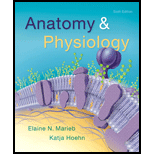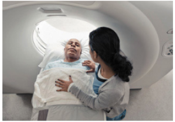
Concept explainers
Remember Mr. Ayers, the bus driver from Chapter 18? When we last saw him, he was headed for surgery. Although his dissected aorta was repaired, by the time surgical exposure and blood vessel clamping had been achieved, the dissection had extended up into the origin of his left common carotid artery. As a result, a clot formed that caused a massive stroke. Unfortunately, this left him with severe and permanent brain damage, and he was declared brain dead.
A discussion of Mr. Ayers’s situation with his family confirmed his status as an organ donor. The organ recovery coordinator evaluated Mr. Ayers’s suitability as a candidate for organ donation. Tissue typing (histocompatibility) tests were conducted, and the results were entered into the UNOS (United Network for Organ Sharing) database. Two potential recipients were identified. Mr. Ayers’s right kidney was given in transplantation to a 35-year-old man, and his left kidney was given to a 27-year-old woman. Following surgery, both recipients were placed on immunosuppressive drug therapy.

Why were the recipients of the two kidneys put on immunosuppressive drug therapy?
Want to see the full answer?
Check out a sample textbook solution
Chapter 20 Solutions
Anatomy & Physiology (6th Edition)
- What was the inaccurate name people associated with HeLa cells? How did Michael Rogers discover Henrietta's real name? Use textual evidence to support your answer.arrow_forwardWhat is Tumor necrosis factor-alpha (TNF-a)?arrow_forwardA vaccine IMAGINERIX was introduced against a new Gloomy virus (hypothetical names). While the vaccinated population were immunized against Gloomy virus, a few reports followed, claiming that some developed symptoms of multiple sclerosis. (a) What is the possible connection between the use of Imaginerix and multiple sclerosis? (b) State ONE possible treatment option for multiple sclerosis.arrow_forward
- Which of the following does NOT result from the malignant proliferation of plasma cells? Question 10 options: A) Lytic bone lesions B) Pancytopenia C) Normal blood volume D) Production of abnormal immunoglobulinsarrow_forwardMarie Curie was a famous Polish-born French scientist known for her pioneering research on radioactivity. Her work not only brought her fame but her death as well; she developed aplastic anemia due to radiation exposure. She experienced recurrent and prolonged infections (viral, bacterial, parasitic, and fungal). Please mention the different types of WBC and the relation to the various infections, and the reasons why she lacked the cell-mediated and the humeral response.arrow_forwardcan I get an explanation for these, please? Thank youarrow_forward
- Bobby has been diagnosed with PKU. His mother wants to know about the treatments. What would you tell her?arrow_forwardNeutrophils are best described as: (a) Phagocytic, have bilobed nucleus and are small (2-5 microns) (b) Respond to chemokines and are primary defense against bacteria (c) Long-lived phagocytic cells. why?arrow_forwardThe following are some well-known abbreviations, which have been used in this chapter. Expand each one to its full form:(a) MALT (b) CMI (c) AIDS (d) NACO (e) HIVarrow_forward
- The most common type of leukemia is: Question 8 options: A) CML. B) CLL. C) AML. D) ALL.arrow_forwardWhy were Henrietta Lacks’ cells unique? What are some of the most important applications HeLa cells have had in advancing medical research and innovation? Explainarrow_forwardWhat do you mean by wandering macrophages?arrow_forward
